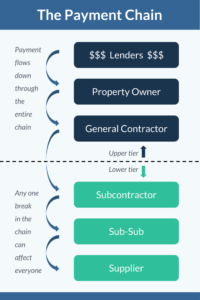

Any contractor or supplier working in the state of Nevada should be familiar with the Nevada preliminary notice. It is an incredibly important step in the mechanics lien process. These notices not only secure the ability to file a mechanics lien but also provide numerous other benefits that can help you get paid faster. Read on to find out all you need to know about the preliminary notice requirements in Nevada.
Table of Contents

The state of Nevada is a notice state, meaning that some form of preliminary notice will be required depending on the circumstances. Under Nevada mechanics lien law, there are technically 3 different types of preliminary notices that should be sent on a construction project.
There is the more traditional preliminary notice, (1) a Notice of Right to Lien, a notice required only on residential projects, (2) Notice of Intent to Lien, and notice required to be sent by prime contractors, (3) Notice to Owner/Subcontractor.
This may seem a bit confusing and trust us; you’re not the only one. Here’s a recent question from Nevada contractor on our Ask an Expert Center: Does your NOTICE TO OWNER qualify as a NOTICE OF RIGHT TO LIEN?

First and foremost, if it’s required, then send a preliminary notice; no questions asked. No one goes into a project anticipating that there will be payment issues, but it’s important to secure your right to file a lien just in case. Besides reserving your mechanics lien rights, there are other benefits to sending a preliminary notice on every job; required or not.
The payment chain on construction projects can get complicated and long, and many times the higher-ups (like owners and GC’s) may not even know that you are on the job. Which is unfortunate, because that’s where the project funds are coming from. By sending a preliminary notice, you are informing them of your participation on the project, and exactly what labor or materials you are providing. This is an easy way to get noticed and speed up payment times.
As for the Notice to Owner/Contractor, will not affect the prime’s or any subs’ mechanics lien rights, but they can be penalized by the Nevada State Contractors Board for failing to send this notice.
Anyone who didn’t contract directly with the property on a Nevada construction project must send a Notice of Right to Lien. The only exception to this is those that are only providing labor. This notice should be sent to the property owner and the prime contractor. This seems pretty straightforward, but it can get complicated quickly. Here’s an interesting scenario that popped up in our Ask an Expert Center: We entered into an agreement with a Contractor to locate street survey monuments & utilities within a subdivision. Who should the Notice of Right to Lien be sent to? There are 100’s of homeowners.
As for the Notice of Intent to Lien, this is required of the same parties as a Notice of Right to Lien, only if they are working on a residential project (including apartments). So that means anyone without a direct contract with the property owner minus laborers.
Prime contractors are the only parties that must send a Notice to Owner/Subcontractor. This notice must be provided to the property owner and all subs and suppliers on the project.
The traditional Notice of Right to Lien must contain the following information.
This is not a notice that the undersigned has not been or does not expect to be paid, but a notice is required by law that the undersigned may, at a future date, record a Notice of Lien as provided by law against the property if the undersigned is not paid.
The Notice of Intent to Lien required on residential projects should contain substantially the same information that is provided on a Notice of Lien claim. This includes:
* For a full breakdown on how to fill out these sections, visit: How to File a Nevada Mechanics Lien.
Lastly, the general contractor notice isn’t nearly as extensive as the other two notices. This simply requires some basic project information, along with the following statements:
The provisions of N.R.S. 108.245, a part of the mechanics’ and materialmen’s lien law of the State of Nevada, require, for your information and protection from hidden liens, that each person or other legal entity who supplies materials to or performs work on a construction project, other than the one who performs only labor, deliver to the owner a notice of the materials and equipment supplied or the work performed. You may receive these notices in connection with the construction project that you propose to undertake.

We’re the Preliminary Notice experts. With us it’s fast, easy, and done right.


A Nevada Notice of Right to Lien can be filed at any time before recording a mechanics lien claim. However, this notice will only secure mechanics lien rights for labor or materials that were provided 31 days from when the notice is received, and everything provided thereafter. So sending the notice within 31 days after the first date of furnishing is the best way to maximize your lien rights.
The residential Notice of Intent to Lien is sent 15 days before filing the lien claim. An interesting aspect about this Nevada notice is that service of the 15-day notice extends the deadline to file and record a mechanics lien. Therefore, if the deadline to file is less than 15 days out, you can still send a valid Notice of Intent to Lien and the required 15 days to file the lien claim.
The prime contractor Notice to Owner/Subcontractor is required to be sent before the execution of the contract. Meaning, it must be delivered before the parties sign or agree to a construction contract. This notice can also be incorporated into the contract terms, and still, meet the statutory requirements of delivery.
All Nevada preliminary notice can be delivered either by personal service or sent by certified mail. The best option is to send certified mail, as it provides proof of when the notice was both sent and received. And, as stated above, the Notice to Owner/Subcontractor, this can be sent in the same manner or the language can be incorporated into the contract. A recent Nevada Supreme Court decision held that the Notice of Right to lien is only valid if it is actually received, therefore actual receipt is likely required for the other forms of notices under NV lien laws. So prepare accordingly.

Any contractor or supplier working in the state of Nevada should be familiar with the Nevada preliminary notice. It is an incredibly important step in the mechanics lien process. These notices not only secure the ability to file a mechanics lien but also provide numerous other benefits that can help you get paid faster. Read on to find out all you need to know about the preliminary notice requirements in Nevada.